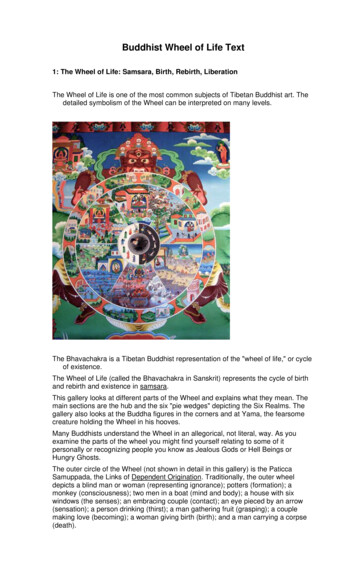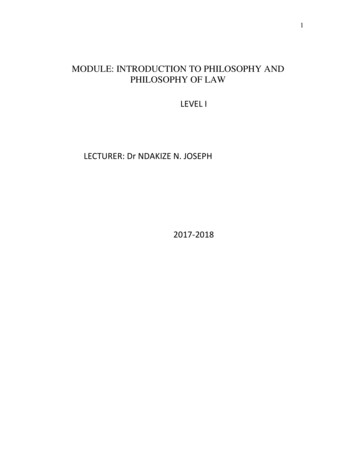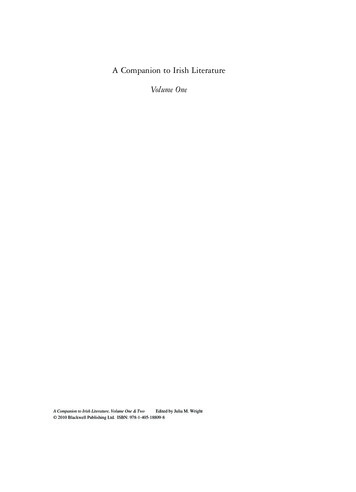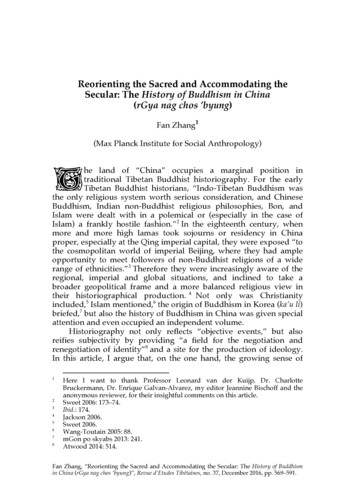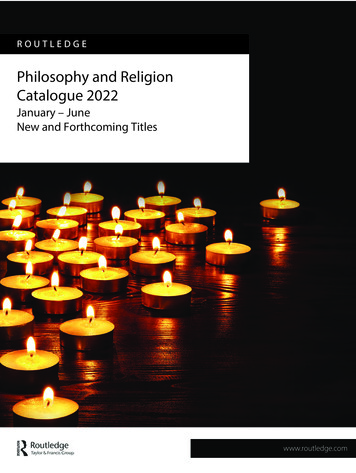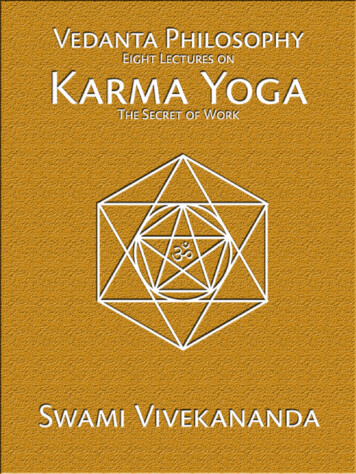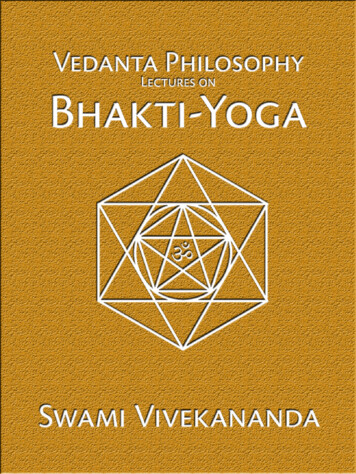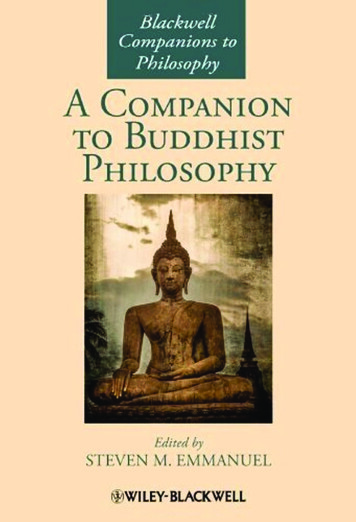
Transcription
A Companion to Buddhist Philosophy
Blackwell Companions to PhilosophyThis outstanding student reference series offers a comprehensive and authoritative survey of philosophy asa whole. Written by today’s leading philosophers, each volume provides lucid and engaging coverage of thekey figures, terms, topics, and problems of the field. Taken together, the volumes provide the ideal basis forcourse use, representing an unparalleled work of reference for students and specialists alike.Already published in the 8.19.20.21.22.23.24.25.26.27.The Blackwell Companion to Philosophy, SecondEditionEdited by Nicholas Bunnin and Eric Tsui-JamesA Companion to EthicsEdited by Peter SingerA Companion to Aesthetics, Second EditionEdited by Stephen Davies, Kathleen Marie Higgins,Robert Hopkins, Robert Stecker, and David E. CooperA Companion to Epistemology, Second EditionEdited by Jonathan Dancy, Ernest Sosa, and MatthiasSteupA Companion to Contemporary Political Philosophy(two-volume set), Second EditionEdited by Robert E. Goodin and Philip PettitA Companion to Philosophy of MindEdited by Samuel GuttenplanA Companion to Metaphysics, Second EditionEdited by Jaegwon Kim, Ernest Sosa, and Gary S.RosenkrantzA Companion to Philosophy of Law and LegalTheory, Second EditionEdited by Dennis PattersonA Companion to Philosophy of Religion, SecondEditionEdited by Charles Taliaferro, Paul Draper,and Philip L. QuinnA Companion to the Philosophy of LanguageEdited by Bob Hale and Crispin WrightA Companion to World PhilosophiesEdited by Eliot Deutsch and Ron BontekoeA Companion to Continental PhilosophyEdited by Simon Critchley and William SchroederA Companion to Feminist PhilosophyEdited by Alison M. Jaggar and Iris Marion YoungA Companion to Cognitive ScienceEdited by William Bechtel and George GrahamA Companion to Bioethics, Second EditionEdited by Helga Kuhse and Peter SingerA Companion to the PhilosophersEdited by Robert L. ArringtonA Companion to Business EthicsEdited by Robert E. FrederickA Companion to the Philosophy of ScienceEdited by W. H. Newton-SmithA Companion to Environmental PhilosophyEdited by Dale JamiesonA Companion to Analytic PhilosophyEdited by A. P. Martinich and David SosaA Companion to GenethicsEdited by Justine Burley and John HarrisA Companion to Philosophical LogicEdited by Dale JacquetteA Companion to Early Modern PhilosophyEdited by Steven NadlerA Companion to Philosophy in the Middle AgesEdited by Jorge J. E. Gracia and Timothy B. NooneA Companion to African-American PhilosophyEdited by Tommy L. Lott and John P. PittmanA Companion to Applied EthicsEdited by R. G. Frey and Christopher Heath WellmanA Companion to the Philosophy of EducationEdited by Randall .43.44.45.46.47.48.49.50.A Companion to African PhilosophyEdited by Kwasi WireduA Companion to HeideggerEdited by Hubert L. Dreyfus and Mark A. WrathallA Companion to RationalismEdited by Alan NelsonA Companion to PragmatismEdited by John R. Shook and Joseph MargolisA Companion to Ancient PhilosophyEdited by Mary Louise Gill and Pierre PellegrinA Companion to NietzscheEdited by Keith Ansell PearsonA Companion to SocratesEdited by Sara Ahbel-Rappe and Rachana KamtekarA Companion to Phenomenology andExistentialismEdited by Hubert L. Dreyfus and Mark A. WrathallA Companion to KantEdited by Graham BirdA Companion to PlatoEdited by Hugh H. BensonA Companion to DescartesEdited by Janet Broughton and John CarrieroA Companion to the Philosophy of BiologyEdited by Sahotra Sarkar and Anya PlutynskiA Companion to HumeEdited by Elizabeth S. RadcliffeA Companion to the Philosophy of History andHistoriographyEdited by Aviezer TuckerA Companion to AristotleEdited by Georgios AnagnostopoulosA Companion to the Philosophy of TechnologyEdited by Jan-Kyrre Berg Olsen, Stig Andur Pedersen,and Vincent F. HendricksA Companion to Latin American PhilosophyEdited by Susana Nuccetelli, Ofelia Schutte,and Otávio BuenoA Companion to the Philosophy of LiteratureEdited by Garry L. Hagberg and Walter JostA Companion to the Philosophy of ActionEdited by Timothy O’Connor and Constantine SandisA Companion to RelativismEdited by Steven D. HalesA Companion to HegelEdited by Stephen Houlgate and Michael BaurA Companion to SchopenhauerEdited by Bart VandenabeeleA Companion to Buddhist PhilosophyEdited by Steven M. EmmanuelForthcoming:A Companion to Rawls, Edited by Jon Mandle andDavid ReidyA Companion to Foucault, Edited by Chris Falzon,Timothy O’Leary, and Jana SawickiA Companion to Derrida, Edited by Leonard Lawlorand Zeynep DirekA Companion to Locke, Edited by Matthew Stuart
A Companion toBuddhist PhilosophyEdited bySteven M. EmmanuelA John Wiley & Sons, Ltd., Publication
This edition first published 2013 2013 John Wiley & Sons, Inc.Wiley-Blackwell is an imprint of John Wiley & Sons, formed by the merger of Wiley’s global Scientific,Technical and Medical business with Blackwell Publishing.Registered OfficeJohn Wiley & Sons Ltd, The Atrium, Southern Gate, Chichester, West Sussex, PO19 8SQ, UKEditorial Offices350 Main Street, Malden, MA 02148-5020, USA9600 Garsington Road, Oxford, OX4 2DQ, UKThe Atrium, Southern Gate, Chichester, West Sussex, PO19 8SQ, UKFor details of our global editorial offices, for customer services, and for information about how to apply forpermission to reuse the copyright material in this book please see our website at www.wiley.com/wiley-blackwell.The right of Steven M. Emmanuel to be identified as the author of the editorial material in this work hasbeen asserted in accordance with the UK Copyright, Designs and Patents Act 1988.All rights reserved. No part of this publication may be reproduced, stored in a retrieval system, ortransmitted, in any form or by any means, electronic, mechanical, photocopying, recording or otherwise,except as permitted by the UK Copyright, Designs and Patents Act 1988, without the prior permission ofthe publisher.Wiley also publishes its books in a variety of electronic formats. Some content that appears in print maynot be available in electronic books.Designations used by companies to distinguish their products are often claimed as trademarks. All brandnames and product names used in this book are trade names, service marks, trademarks or registeredtrademarks of their respective owners. The publisher is not associated with any product or vendormentioned in this book. This publication is designed to provide accurate and authoritative information inregard to the subject matter covered. It is sold on the understanding that the publisher is not engaged inrendering professional services. If professional advice or other expert assistance is required, the services ofa competent professional should be sought.Library of Congress Cataloging-in-Publication DataA companion to Buddhist philosophy / edited by Steven M. Emmanuel.pages cm – (Blackwell companions to philosophy ; 139)Includes bibliographical references and index.ISBN 978-0-470-65877-2 (hardback)1. Buddhist philosophy. I. Emmanuel, Steven M., editor of compilation.B162.C66 2013181'.043–dc232012036590A catalogue record for this book is available from the British Library.Cover image: Statue of Buddha, Sukhothai, Thailand. Photo Paul Davis.Cover design by Nicki Averill Design and Illustration.Set in 10/12.5 pt Photina by Toppan Best-set Premedia Limited12013
Are not the mountains, waves, and skies, a partOf me and of my soul, as I of them?– Lord Byron
ContentsNotes on ContributorsAcknowledgmentsList of AbbreviationsIntroductionSteven M. EmmanuelPart IConceptual Foundationsxixviiixix1111The Philosophical Context of Gotama’s ThoughtStephen J. Laumakis132Dukkha, Non-Self, and the Teaching on the Four “Noble Truths”Peter Harvey263The Conditioned Co-arising of Mental and Bodily Processeswithin Life and Between LivesPeter HarveyPart IIMajor Schools of Buddhist Thought46694TheravādaAndrew Skilton715Indian Mahāyāna BuddhismJames Blumenthal866Tibetan Mahāyāna and VajrayānaDouglas Duckworth997East Asian BuddhismRonald S. Green110vii
contentsPart IIIThemes in Buddhist PhilosophyA. Metaphysics1271298Metaphysical Issues in Indian Buddhist ThoughtJan Westerhoff1299Emptiness in Mahāyāna Buddhism: Interpretations and ComparisonsDavid Burton15110 Practical Applications of the Perfection of Wisdom Sūtra andMadhyamaka in the Kālacakra Tantric TraditionVesna A. Wallace16411 The Huayan Metaphysics of TotalityAlan Fox18012 Forms of Emptiness in ZenBret W. Davis19013 Between the Horns of Idealism and Realism: The Middle Wayof MadhyamakaGraham Priest214B. Epistemology22314 A Survey of Early Buddhist EpistemologyJohn J. Holder22315 Reason and Experience in Buddhist EpistemologyChristian Coseru24116 The Three Truths in Tiantai BuddhismBrook Ziporyn25617 “Spiritual Exercise” and Buddhist Epistemologists in India and TibetMatthew T. Kapstein27018 Yogic Perception, Meditation, and Enlightenment: The EpistemologicalIssues in a Key DebateTom J. F. Tillemans290C. Language and Logic30719 Language and Logic in Indian Buddhist ThoughtBrendan S. Gillon30720 Buddhist Philosophy of LogicKoji Tanaka32021 Candrakīrti on the Limits of Language and LogicKaren C. Lang331viii
contents22 On the Value of Speaking and Not Speaking: Philosophy ofLanguage in Zen BuddhismSteven Heine34923 The Voice of Another: Speech, Responsiveness, and BuddhistPhilosophyRichard F. Nance366D. Philosophy of Mind37724 Mind in Theravāda BuddhismMaria Heim37725 Philosophy of Mind in BuddhismRichard P. Hayes39526 Cognition, Phenomenal Character, and Intentionality in TibetanBuddhismJonathan Stoltz40527 The Non-Self Theory and Problems in Philosophy of MindJoerg Tuske419E. Ethics and Moral Philosophy42928 Ethical Thought in Indian BuddhismChristopher W. Gowans42929 Character, Disposition, and the Qualities of the Arahats as a Means ofCommunicating Buddhist Philosophy in the SuttasSarah Shaw45230 Compassion and the Ethics of ViolenceStephen Jenkins46631 Buddhist Ethics and Western Moral PhilosophyWilliam Edelglass476F. Social and Political Philosophy49132 The Enlightened Sovereign: Buddhism and Kingship in India and TibetGeorgios T. Halkias49133 Political Interpretations of the Lotus SūtraJames Mark Shields51234 Socially Engaged Buddhism: Emerging Patterns of Theory and PracticeChristopher S. Queen52435 Comparative Reflections on Buddhist Political Thought: Aśoka,Shambhala and the General WillDavid Cummiskey536ix
contentsPart IVBuddhist Meditation36 Buddhist Meditation: Theory and PracticeCharles Goodman55355537 Seeing Mind, Being Body: Contemplative Practice and BuddhistEpistemologyAnne Carolyn Klein57238 From the Five Aggregates to Phenomenal Consciousness:Towards a Cross-Cultural Cognitive ScienceJake H. Davis and Evan Thompson585Part V599Contemporary Issues and Applications39 Buddhism and Environmental EthicsSimon P. James60140 Buddhism and Biomedical IssuesDamien Keown61341 War and Peace in Buddhist PhilosophySallie B. King63142 Buddhist Perspectives on Human RightsKarma Lekshe Tsomo65143 Buddhist Perspectives on Gender IssuesRita M. Gross66344 Diversity Matters: Buddhist Reflections on the Meaning of DifferencePeter D. Hershock675Further Reading693Index696x
Notes on ContributorsJames Blumenthal is Associate Professor in the Philosophy Department at OregonState University and founding faculty member at Maitripa College, Portland. He is theauthor of numerous articles and books on Buddhism, including The Ornament of theMiddle Way: A Study of the Madhyamaka Thought of Śāntarakṣita (Snow Lion, 2004),editor of Incompatible Visions: South Asian Religions in History and Culture (University ofWisconsin Press, 2006), and co-author (with Geshe Lhundup Sopa) of Steps on the Pathto Enlightenment: A Commentary on Tsongkhapa’s Lamrim Chenmo, Vol. 4: Samatha(Wisdom, 2012). In 2004 he had the honor of translating Nāgārjuna’s “Sixty Stanzasof Reasoning” for His Holiness the Dalai Lama on the occasion of his public lectureson the text in Pasadena, California.David Burton is Senior Lecturer in the Department of Theology and Religious Studiesat Canterbury Christ Church University in the UK. Along with a number of articles, hehas published two books: Buddhism, Knowledge and Liberation: A Philosophical Study(Ashgate, 2004) and Emptiness Appraised: A Critical Study of Nāgārjuna’s Philosophy(RoutledgeCurzon, 1999).Christian Coseru is Associate Professor in the Department of Philosophy at theCollege of Charleston, South Carolina. He is the author of several articles on Buddhistphilosophy and a book, Perceiving Reality: Consciousness, Intentionality, and Cognition inBuddhist Philosophy (Oxford University Press, 2012).David Cummiskey is Professor of Philosophy at Bates College, Lewiston, Maine. He isthe author of Kantian Consequentialism (Oxford University Press, 1996), and his recentarticles include “Competing Conceptions of the Self in Kantian and Buddhist MoralTheories,” in Cultivating Personhood: Kant and Asian Philosophy (Walter de Gruyter,2010), “The Law of Peoples,” in The Morality and Global Justice Reader (Westview Press,2011), and “Dignity, Contractualism, and Consequentialism,” in Utilitas, 20/4 (2008).Bret W. Davis is Associate Professor of Philosophy at Loyola University Maryland.Among his books are Heidegger and the Will: On the Way to Gelassenheit (NorthwesternUniversity Press, 2007); co-edited with Brian Schroeder and Jason M. Wirth, Japaneseand Continental Philosophy: Conversations with the Kyoto School (Indiana University Press,xi
notes on contributors2011); and co-edited with Fujita Masakatsu, Sekai no naka no Nihon no tetsugaku (Japanese Philosophy in the World) (Showado, 2005). He has also published numerousarticles in English and in Japanese on continental and comparative philosophy, on theKyoto School, and on Zen.Jake H. Davis is a doctoral student in philosophy and cognitive science at the GraduateCenter of the City University of New York, visiting faculty at the Barre Center for Buddhist Studies, Massachusetts, and a visiting scholar in psychiatry at Brown University.He trained in Buddhist theory and meditative practice under the meditation masterSayadaw U Pandita of Burma and served for a decade as an interpreter between Burmeseand English for meditation retreats in Burma and abroad.Douglas Duckworth is Assistant Professor in the Department of Philosophy andHumanities at East Tennessee State University. He is the author of Mipam on BuddhaNature: The Ground of the Nyingma Tradition (SUNY Press, 2008) and Jamgön Mipam: HisLife and Teachings (Shambhala, 2011). He also translated Bötrül’s Distinguishing theViews and Philosophies: Illuminating Emptiness in a Twentieth-Century Tibetan BuddhistClassic (SUNY Press, 2011).William Edelglass is Professor of Philosophy and Environmental Studies at MarlboroCollege, Vermont. Previously he taught at the Institute of Buddhist Dialectics in Dharamsala, India. He has published widely in Indian and Tibetan Buddhist philosophy,environmental philosophy, and contemporary continental philosophy. He is co-editorof the journal Environmental Philosophy and of Facing Nature: Levinas and EnvironmentalPhilosophy (Duquesne University Press, 2012), Buddhist Philosophy: Essential Readings(Oxford University Press, 2009), and The Oxford Handbook of World Philosophy (2010).Alan Fox is Professor of Asian and Comparative Philosophy and Religion in thePhilosophy Department at the University of Delaware. He has published on ChineseBuddhism and philosophical Daoism. His publications include “Self-Reflection in theSanlun Tradition: Madhyamika as the Deconstructive Conscience of Buddhism,” inthe Journal of Chinese Philosophy (March 1992), “Process Ecology and ‘Ideal Dao,’”in the Journal of Chinese Philosophy (March 2005), and “Dushun’s Huayan Fajie GuanMen (Meditative Approaches to the Huayana Dharmadātu),” in Buddhist Philosophy: Essential Readings (Oxford University Press, 2009).Brendan S. Gillon is Professor of Linguistics at McGill University. He has researchinterests in the history of logic and metaphysics in India, Sanskrit linguistics, andnatural language semantics, and has published extensively in all of these areas. He iseditor of Logic in Earliest Classical India (Motilal Banarsidass, 2010) and co-editor ofSemantics: A Reader (Oxford University Press, 2004). In collaboration with RichardHayes, he has translated the first 38 verses and their prose commentary of Dharmakīrti’s Svarthanumana chapter of the Pramanavarttika.Charles Goodman is Associate Professor in the Philosophy Department and theDepartment of Asian and Asian-American Studies at Binghamton University. He isthe author of several published articles on Buddhist philosophy and of the bookConsequences of Compassion: An Interpretation and Defense of Buddhist Ethics (OxfordUniversity Press, 2009).xii
notes on contributorsChristopher W. Gowans is Professor of Philosophy at Fordham University. He is theeditor of Moral Disagreements (Routledge, 2000) and Moral Dilemmas (Oxford UniversityPress, 1989) and the author of Philosophy of the Buddha (Routledge, 2003).Ronald S. Green is Assistant Professor in the Department of Philosophy and Religious Studies at Coastal Carolina University, South Carolina. He is an editor of abook series on religions and social engagement which includes Buddhist Roles inPeacemaking: How Buddhism can Contribute to Sustainable Peace (Blue Pine Books, 2009).His research focuses on East Asian developments of Yogācāra and tantric Buddhistphilosophy.Rita M. Gross, before her retirement, was for twenty-five years Professor of Comparative Studies in Religion at the University of Wisconsin–Eau Claire. She is a well-knownDharma teacher and the author of many books and articles. Her best-known books areBuddhism after Patriarchy (SUNY Press, 1993), Feminism and Religion: An Introduction(Beacon Press, 1996), and A Garland of Feminist Reflections: Forty Years of ReligiousExploration (University of California Press, 2009). She was co-editor of Buddhist–Christian Studies for ten years and has been active in inter-religious discussion.Georgios T. Halkias is Research Fellow and Coordinator of Religions of Central Asiaat the Centre of Religious Studies at the Ruhr University in Bochum and a Fellow at theOxford Centre of Buddhist Studies. Among his publications are Luminous Bliss: A Religious History of Pure Land Literature in Tibet (University of Hawai‘i Press) and a numberof articles on Tibetan and Central Asian Buddhism and history and interdisciplinarystudies in religion.Peter Harvey is Emeritus Professor of Buddhist Studies at the University of Sunderlandin the UK. His research focuses on early Buddhist thought and practices and Buddhistethics. He is the editor of Buddhist Studies Review and the author of An Introduction toBuddhism: Teachings, History and Practices (Cambridge University Press, 1990, 2nd edn2012), The Selfless Mind: Personality, Consciousness and Nirvana in Early Buddhism(Curzon Press, 1995), and An Introduction to Buddhist Ethics: Foundations, Values andPractices (Cambridge University Press, 2000). He is currently working on SpiritualNobility in Early Buddhism: Noble Path, Noble Persons, and the Four True Realities thatThey See.Richard P. Hayes is Associate Professor of Philosophy at the University of New Mexico.He earned his doctorate in Sanskrit and Indian studies at the University of Toronto. Hehas taught in the departments of Philosophy and Religious Studies at the University ofToronto and McGill University and as Numata guest professor of Buddhism at LeidenUniversity.Maria Heim is Associate Professor of Buddhist Studies at Amherst College, Massachusetts. She holds a BA from Reed College and a PhD in Sanskrit and Indian studiesfrom Harvard University. She works on South Asian Buddhism, particularly onTheravāda, and is currently focusing on the thought of Buddhaghosa. She is interestedin moral psychology and is completing a book on Theravāda understandings ofagency and intention in the different canonical and commentarial genres of the Pāliliterature.xiii
notes on contributorsSteven Heine is Professor of Religious Studies and History as well as Associate Directorof the School of International and Public Affairs and Director of Asian Studies atFlorida International University. His research specialty is the origins and developmentof Zen Buddhism, especially the life and teachings of Dōgen, founder of the Sōtō sect.He has published two dozen books, including The Zen Poetry of Dōgen (Tuttle, 1997)and, with Oxford University Press, Opening a Mountain (2002), Did Dōgen Go to China?(2006), Zen Masters (2010), and Dōgen: Textual and Historical Studies (2012).Peter D. Hershock is Director of the Asian Studies Development Program at theEast–West Center in Honolulu, Hawai‘i. His research has focused mainly on usingBuddhist conceptual resources to address contemporary issues. Among his booksare Liberating Intimacy: Enlightenment and Social Virtuosity in Ch’an Buddhism (SUNYPress, 1996), Reinventing the Wheel: A Buddhist Response to the Information Age (SUNYPress, 1999), Chan Buddhism (University of Hawai‘i Press, 2005), Buddhism in thePublic Sphere: Reorienting Global Interdependence (Routledge, 2006), and Valuing Diversity: Buddhist Reflection on Realizing a More Equitable Global Future (SUNY Press, 2012).John J. Holder is Associate Professor of Philosophy at St. Norbert College, Wisconsin.He is the author of Early Buddhist Discourses (Hackett, 2006), a volume containingEnglish translations of Pāli discourses that are essential for the study of early Buddhistphilosophy. He has also published articles on early Buddhist epistemology, ethics, andsocial theory. His research focus is on comparative philosophy, specifically comparingearly Buddhism and classical American pragmatism with the aim of developing a naturalistic theory of aesthetics and religious meaning.Simon P. James is Senior Lecturer in Philosophy at Durham University in the UK. Heis the author of Zen Buddhism and Environmental Ethics (Ashgate, 2004), The Presenceof Nature: A Study in Phenomenology and Environmental Philosophy (Palgrave, 2009), and(with David E. Cooper) Buddhism, Virtue and Environment (Ashgate, 2005).Stephen Jenkins is Professor of Religious Studies at Humboldt State University. Hisresearch is focused on Buddhist concepts of compassion, their philosophical grounding,and their ethical implications. His current work explores these themes in justificationsof warfare, penal codes, compassionate killing, tantric sādhanas for killing, and theAśokan edicts.Matthew T. Kapstein is currently Director of Tibetan Studies at the École Pratiquedes Hautes Études in Paris and Numata Visiting Professor of Buddhist Studies in theDivinity School of the University of Chicago. His publications include The Tibetan Assimilation of Buddhism: Conversion, Contestation, and Memory (Oxford University Press,2000), Reason’s Traces: Identity and Interpretation in Indian and Tibetan Buddhist Thought(Wisdom, 2001), The Tibetans (Blackwell, 2006), and, in the Clay Sanskrit Series, TheRise of Wisdom Moon (New York University Press, 2009).Damien Keown is Emeritus Professor of Buddhist Ethics at Goldsmiths College, University of London. His main research interests are theoretical and applied aspects ofBuddhist ethics, with particular reference to contemporary issues. He is the authorof many books and articles, among them The Nature of Buddhist Ethics (Palgrave,2001), Buddhism and Bioethics (Palgrave, 2001), Buddhism: A Very Short Introductionxiv
notes on contributors(Oxford University Press, 2000), Buddhist Ethics: A Very Short Introduction (OxfordUniversity Press, 2006), and the Oxford Dictionary of Buddhism (2003). In 1994 hefounded the Journal of Buddhist Ethics with Charles S. Prebish, with whom he also cofounded the Routledge Critical Studies in Buddhism Series, and co-edited the RoutledgeEncyclopedia of Buddhism.Sallie B. King is Professor of Philosophy and Religion at James Madison University,Virginia. She is the author of Buddha Nature (SUNY Press, 1991), Journey in Search ofthe Way: The Spiritual Autobiography of Satomi Myodo (SUNY Press, 1993), Being Benevolence: The Social Ethics of Engaged Buddhism (University of Hawai‘i Press, 2005), andSocially Engaged Buddhism (University of Hawai‘i Press, 2009). She is co-editor (withChristopher S. Queen) of Engaged Buddhism: Buddhist Liberation Movements in Asia(SUNY Press, 1996) and (with Paul O. Ingram) of The Sound of Liberating Truth: Buddhist–Christian Dialogues in Honor of Frederick J. Streng (Curzon Press, 1999).Anne Carolyn Klein is Professor of Religious Studies at Rice University and a foundingdirector and resident teacher of the Dawn Mountain Center, Houston. Her work centerson the Tibetan Buddhist tradition and its Indian roots, with a special interest in theinterplay between intellectual understanding and contemplative practice. She isthe author or translator of six books, notably Heart Essence of the Vast Expanse: A Storyof Transmission (Snow Lion, 2010) and the recently republished Meeting the Great BlissQueen (Snow Lion, 2008).Karen C. Lang is Professor of Indian Religions in the Department of ReligiousStudies and two-time Director of the Center for South Asian Studies at the Universityof Virginia. Her publications include Four Illusions: Candrakīrti’s Advice for Travelerson the Bodhisattva Path (Oxford University Press, 2003) and Āryadeva’s Catuḥśataka: Onthe Bodhisattva’s Cultivation of Merit and Knowledge (Akademisk Forlag, 1986), as wellas numerous articles on Buddhist philosophy and literature. She has been a memberof the team that produced the first English translation of Tsongkhapa’s The GreatTreatise on the Stages of the Path to Enlightenment. Her primary research and translation interests focus on the work of the seventh-century Indian Buddhist philosopherCandrakīrti.Stephen J. Laumakis is Professor of Philosophy and Director of the Aquinas ScholarsHonors Program at the University of St. Thomas in St. Paul, Minnesota. Among hispublications are articles in East–West Connections: Review of Asian Studies, the ModernSchoolman, American Catholic Philosophical Quarterly, and a book, An Introduction to Buddhist Philosophy (Cambridge University Press, 2008).Richard F. Nance is Assistant Professor of South Asian Buddhism in the Departmentof Religious Studies at Indiana University. He has published work in the Journal of IndianPhilosophy, Religion Compass, and the Journal of the International Association of BuddhistStudies, and is the author of Speaking for Buddhas: Scriptural Commentary in Indian Buddhism (Columbia University Press, 2012).Graham Priest is Boyce Gibson Professor of Philosophy at the University of Melbourne, Distinguished Professor at the Graduate Center, City University of New York,and Arché Professorial Fellow at the University of St. Andrews. His books includexv
notes on contributorsIn Contradiction (Nijhoff, 1987), Beyond the Limits of Thought (Clarendon Press, 2002),Towards Non-Being (Clarendon Press, 2005), Doubt Truth to be a Liar (Clarendon Press,2006), and Introduction to Non-Classical Logic (Cambridge University Press, 2008).Christopher S. Queen is Lecturer on Buddhism and World Religions at Harvard University. Among his publications are Engaged Buddhism: Buddhist Liberation Movementsin Asia (with Sallie King; SUNY Press, 1996); American Buddhism: Methods and Findingsin Recent Scholarship (with Duncan Williams; Curzon Press, 1999); Engaged Buddhismin the West (Wisdom 2000); and Action Dharma: New Studies in Engaged Buddhism (withCharles Prebish and Damien Keown; RoutledgeCurzon, 2003).Sarah Shaw has membership of the Faculty of Oriental Studies and Wolfson College,Oxford University, and is an honorary fellow of the Oxford Centre for Buddhist Studies.She is the author of a number of books on Buddhist meditation and narrative, includingBuddhist Meditation: An Anthology of Texts from the Pali Canon (Routledge, 2006) andIntroduction to Buddhist Meditation (Routledge, 2008). She is also co-editor (with LindaCovill and Ulrike Roesler) of Lives Lived, Lives Imagined: Biographies of Awakening(Wisdom, 2010).James Mark Shields is Assistant Professor of Comparative Humanities and AsianThought at Bucknell University, Lewisburg, Pennsylvania, and Research Associate atthe Reischauer Institute for Japanese Studies, Harvard University. He is the author ofCritical Buddhism: Engaging with Modern Japanese Buddhist Thought (Ashgate, 2011) andco-editor (with Victor Sōgen Hori and Richard P. Hayes) of Teaching Buddhism in theWest: From the Wheel to the Web (Routledge, 2003). He is currently working on a bookmanuscript entitled Warp and Woof: Modernism and Progressivism in Japanese Buddhism,1886–1936.Andrew Skilton is a Senior Research Fellow in the Department of Theology and Religious Studies at King’s College London and Spalding Fellow at Clare Hall, Cambridge.His research focuses on textual sources from Indian and South-East Asian Buddhismin Sanskrit and Pāli.Jonathan Stoltz is Associate Professor of Philosophy at the University of St. Thomasin St. Paul, Minnesota. He has authored papers on Buddhist epistemology in numerousjournals, including Philosophical Quarterly, Philosophy East and West, and the Journal ofthe International Association of Buddhist Studies. He is currently writing a book on philosophy of mind in twelfth-century Tibetan Buddhism.Koji Tanaka is Senior Lecturer in the Department of Philosophy at the University ofAuckland, New Zealand. A specialist in logic and Buddhist philosophy, he contributed“A Dharmakirtian Critique of Nagarjunians” to Pointing at the Moon (Oxford UniversityPress, 2009) and is a co-author of Moonshadows: Conventional Truth in Buddhist Philosophy (Oxford University Press, 2011).Evan Thompson is Professor of Philosophy at the University of Toronto. He is theauthor of Mind in Life: Biolo
Language in Zen Buddhism 349 Steven Heine 23 The Voice of Another: Speech, Responsiveness, and Buddhist Philosophy 366 Richard F. Nance D. Philosophy of Mind 377 24 Mind in Theravāda Buddhism 377 Maria Heim 25 Philosophy of Mind in Buddhism 395 Richard P. Hayes 26 Cognition, Phenome
